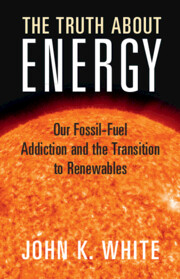Book contents
- The Truth About Energy
- Reviews
- The Truth About Energy
- Copyright page
- Dedication
- Contents
- Preface
- Acknowledgments
- A Word about Numbers
- Introduction
- Part I Out with the Old
- 1 Wood to Coal
- 2 Oil and Gas: Twentieth-Century Prosperity
- 3 The Nuclear World: Atoms for Peace
- Part II In with the New
- Part III Less Is More
- Afterword
- Book part
- Notes
- Select Bibliography
- Index
2 - Oil and Gas: Twentieth-Century Prosperity
from Part I - Out with the Old
Published online by Cambridge University Press: 01 February 2024
- The Truth About Energy
- Reviews
- The Truth About Energy
- Copyright page
- Dedication
- Contents
- Preface
- Acknowledgments
- A Word about Numbers
- Introduction
- Part I Out with the Old
- 1 Wood to Coal
- 2 Oil and Gas: Twentieth-Century Prosperity
- 3 The Nuclear World: Atoms for Peace
- Part II In with the New
- Part III Less Is More
- Afterword
- Book part
- Notes
- Select Bibliography
- Index
Summary
The great discoveries of the past two and a half centuries – the steam engine, electromagnetic induction, the electric power grid, the internal combustion engine, the transistor, personal computers, the internet – change not just the way we live, but an entire global economy. Nothing, however, created more change or made more millionaires than one discovery. By the early 1900s, the iron carriage had made its appearance on the streets of our booming cities, but a new kind of engine and a new kind of fuel would be needed to make a “gasmobile” run. Oil.
Despite the many advances, however, since the start of the petroleum era, ecosystems are failing because of increased industrialization, combustion pollution, and greenhouse gases. Are we seeing the beginning of the end, the twilight of our most gleaming idol? Is the next great global energy transition being forced upon us? In the words of Ahmed Zaki Yamani, Saudi oil minister from 1962 to 1986, “the Stone Age did not end for lack of stone and the Oil Age will end long before the world runs out of oil.” Alas, short-term profits and share price is still being valued over environmental degradation and global warming.
Keywords
- Type
- Chapter
- Information
- The Truth About EnergyOur Fossil-Fuel Addiction and the Transition to Renewables, pp. 68 - 192Publisher: Cambridge University PressPrint publication year: 2024

